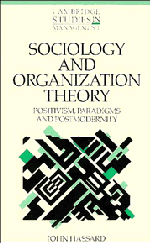Book contents
- Frontmatter
- Contents
- List of figures and tables
- Acknowledgements
- Introduction
- 1 Foundations of orthodoxy
- 2 The hegemony of systems
- 3 From functionalism to fragmentation
- 4 Closed paradigms and analytical openings
- 5 Multiple paradigm research
- 6 Postmodernism and organization
- Notes
- Bibliography
- Author index
- Subject index
- Cambridge Studies in Management
1 - Foundations of orthodoxy
Published online by Cambridge University Press: 03 May 2011
- Frontmatter
- Contents
- List of figures and tables
- Acknowledgements
- Introduction
- 1 Foundations of orthodoxy
- 2 The hegemony of systems
- 3 From functionalism to fragmentation
- 4 Closed paradigms and analytical openings
- 5 Multiple paradigm research
- 6 Postmodernism and organization
- Notes
- Bibliography
- Author index
- Subject index
- Cambridge Studies in Management
Summary
Introduction
In this chapter we trace the origins of functionalism and systems theory in social science. We illustrate how the social systems approach draws inspiration from writings which suggest conceptual parallels between societies and organisms. The way is prepared for a deconstruction of this approach by establishing the foundations upon which its mode of theorizing rests.
To achieve this, we first examine the work of some of the founding fathers of social science. The majority of the chapter is devoted to an appreciation of the influence of Auguste Comte, John Stuart Mill, Herbert Spencer and Emile Durkheim on the development of social systems thinking. We document how this influence is derived mainly from their writings on principles of positivism and evolution.
At the end of the chapter we suggest that these principles are translated into modern social science through the approach known as structural-functionalism. It was through developments in sociological functionalism that an ‘orthodoxy’ of systems analysis was established in organization theory.
Founding fathers of social science
Our account of sociological orthodoxy begins with the antecedents of sociological positivism. Although elements of a positivist heritage can be found in the philosophy of the ancient Greeks, we begin where for many sociology itself begins, with the writings of Auguste Comte (1798–1857).
- Type
- Chapter
- Information
- Sociology and Organization TheoryPositivism, Paradigms and Postmodernity, pp. 4 - 18Publisher: Cambridge University PressPrint publication year: 1993



